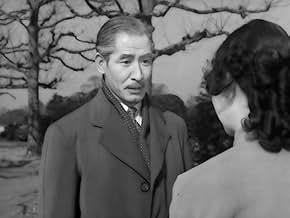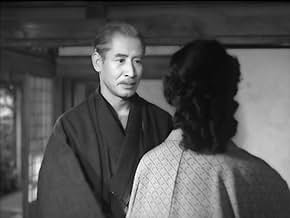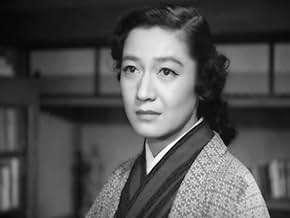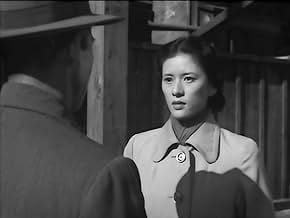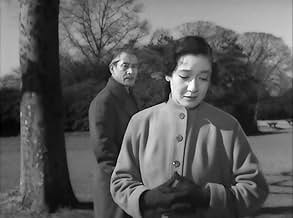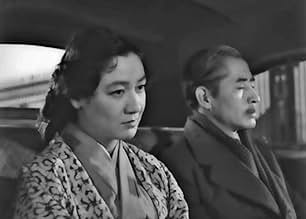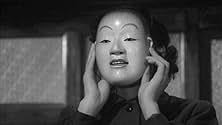Ajouter une intrigue dans votre langueAn ingratiating bride develops warm ties to her father-in-law while her cold husband blithely slights her for another woman.An ingratiating bride develops warm ties to her father-in-law while her cold husband blithely slights her for another woman.An ingratiating bride develops warm ties to her father-in-law while her cold husband blithely slights her for another woman.
- Réalisation
- Scénario
- Casting principal
- Récompenses
- 1 victoire et 1 nomination au total
Avis à la une
And yet I'll gladly die painfully on this hill: Every single one of his movies is terrible out of principle.
I've you've seen one Naruse, you've seen them all because there is literally nothing to it. Every single story - this one included - is basically about a ridiculously noble, self-pitying, suffering woman in a world where virtually every man is a smug, condescending parody of a man.
Women always have the moral highground and the whole thing is nothing but a mawkish didactic-play with the depth of a sunday morning cartoon.
It's redundand to say anything about his laughable radical feminism and I want my review to finally get through.
Again, his movies are objectively bad, people just don't (want to) see it because we live in objectively bad times.
The story is simple enough. A man bonds with his daughter-in-law, and is upset by the way she's treated by his odious son.
But constantly through the movie I felt like I was just missing something. Someone makes a comment and then the woman turns her head in a way to suggest something significant has happened. The man spends time talking about when someone mispronounces a word and I can't figure out why that's interesting.
I can see there is a concept of proper behavior but I can't quite find its outlines. A lot is left unsaid and I'm not sure what is meant.
I just felt kind of lost.
It's not a problem I have with all Japanese movies. I love Kurosawa, after all.
I'm not giving this a star rating because I don't feel qualified to judge this movie. It is well filmed and looks very nice, the acting is quite good, and the final scene is lovely and touching, yet I did not, for the most part, enjoy it, and if I were to give a star rating based on my subjective experience I would give it a 6 at best.
I can't help but wonder if this movie was considered quite forward or daring or maybe even racy for its release date of 1954. If you're familiar with Japanese culture around this time, you know that tradition ruled and emotions and personal issues were skirted around and rarely confronted head on. The norm was to internalize everything. This movie actually does the opposite, and it does it expertly.
Well acted. Directed with perfection. Poignant dialogue. And composer Ichiro Saito nails the music score with a wonderfully romantic quality. My only critique is the editing is a bit choppy in spots, but it doesn't detract from the overall genius of the film.
One of the things altered relative to Yasunari Kawabata's novel is the elderly man's mental state, which in this adaptation isn't declining with age, with accompanying melancholy. Another is his relationship with his daughter-in-law; clearly they have a connection in the film, but it's based on simple kindness and admiration, and erotic feelings on his part aren't involved. The result is a character who is on the surface a decent old man, still married to his own wife despite his own indiscretions and having been more attracted to her older sister long ago. He's not particularly effective in reining in his son, however, and he doesn't give his own daughter enough affection or attention, reserving those things for his daughter-in-law. In that sense he's failed in life.
As in many of her films, Setsuko Hara is the brightest light in the cast. Her character is simple, kind, and filial (derisively referred to as "childlike" by her husband), but shows a toughness in the actions she takes. Hara brings out the emotions very well, and while the ending gets a little melodramatic, it has power. Overall, just a very well done, well-paced film from Mikio Naruse.
Le saviez-vous
- AnecdotesSô Yamamura, who portrays Shingo the father, was actually one year younger than Ken Uehara, who portrayed his son Shuichi.
- Citations
Shingo Ogata: My mind is getting very foggy these days. Even when I look at a sunflower, it reminds me of what's in my head. If only what's in my head were as grand as that sunflower. I wish there was a way to take it off and have it cleaned or repaired. That's what I was thinking on the way home.
Kikuko Ogata: [laughs] Oh, father-in-law.
Shingo Ogata: Just take off my head and take it to the hospital like taking laundry to the cleaners.
Kikuko Ogata: That's very funny.
Shingo Ogata: In other words, while the mind is getting cleaned or repaired, the body will rest in the meantime.
Kikuko Ogata: You're too much, father-in-law.
Shingo Ogata: The body will have a good rest, without even dreaming.
Meilleurs choix
Détails
- Date de sortie
- Pays d’origine
- Langue
- Aussi connu sous le nom de
- Sound of the Mountain
- Société de production
- Voir plus de crédits d'entreprise sur IMDbPro
- Durée
- 1h 35min(95 min)
- Couleur
- Mixage
- Rapport de forme
- 1.37 : 1

